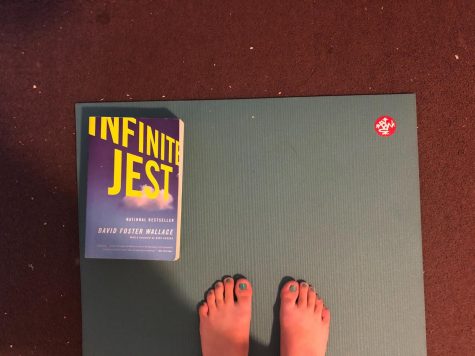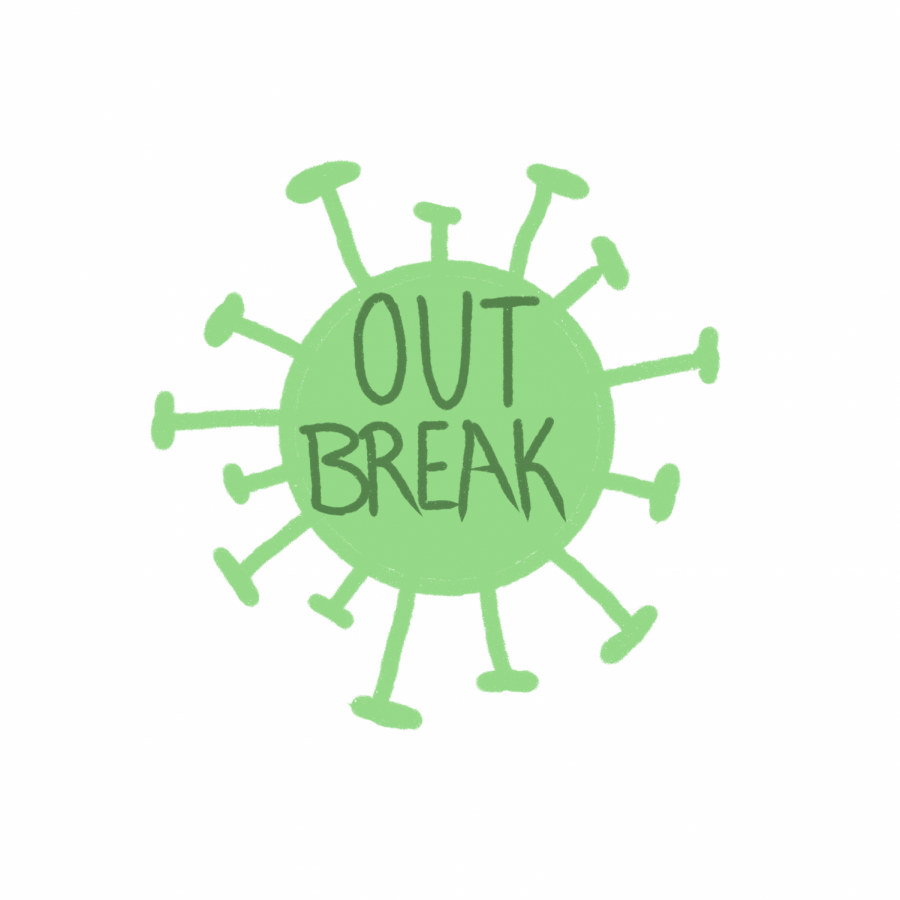The Outbreak | Well, now I’m never going to read “Infinite Jest”
The Outbreak is a new blog describing the different ways the coronavirus pandemic has affected our lives.
In life, there are only two things I have consistently lied about. One of these things is my height — my driver’s license says I am 5’5 when really, I’m only 5’3, and that’s on a good day. But my other, more relevant great lie in life is that I’ve read David Foster Wallace’s monster 1,100-page novel, “Infinite Jest.”
Two years ago, I had a gift card to the bookstore and I purchased the book under the philosophy that, since I am using money to buy this book, I’ll feel pressure to actually read it rather than just checking it out from the library and returning it without ever opening it — which I’ve done three times. I got 176 pages in, and I gave up. Then, I told a professor I’d try again, and read it over the summer. When she asked how it went, I said great. Technically I was telling the truth. I did a great job reading, up to page 38.
Every year, I bring the book to school with me and I say, “This will be the semester I read it.” As I quarantine myself in Pittsburgh, I’ve been making great use of the book. I prop my laptop on top of the novel while I’m Zooming, so that my head isn’t cut off in the camera. When I practice yoga in my living room, it also works perfectly as a prop to make some of the poses more accessible. But one thing I haven’t done with the book is read it. And I’m slowly coming to terms with the fact that, if I don’t read “Infinite Jest” while the local government is literally ordering me not to leave my house, then I will probably never read “Infinite Jest.”

I am a writer, and I love to read. And despite the controversy surrounding him, I think David Foster Wallace is an important literary figure. In his nonfiction work, he pioneered the use of sarcastic, drawn-out footnotes, and as far as I’m concerned, nobody will ever be able to master this the way he did. He invented words and wrote sentences with more clauses than any other writer I’ve ever read. When I try to mimic this, it gives my professors heartburn. And maybe that’s why I’ve always felt pressure to read “Infinite Jest,” which is his most famous work.
Essentially, the novel is a long-winded comedy about a screwed-up family, set in an addict’s halfway house and a tennis academy. It — allegedly — examines the pursuit of happiness in America and explores entertainment, why it dominates our lives and how we fail to connect with other people. I only know this because I am paraphrasing a New Yorker article — probably the closest I will ever come to reading the book.
And the more I think about it, the more unsure I become that anyone has actually read this book. Author Shalom Auslander argues in The Telegraph that there are certain books no one has read ever, but lies about having read regardless.
“The great thing about these books is that not only does everyone agree they’re great, but nobody has ever read them … David Foster Wallace’s ‘Infinite Jest’ (1996) is another [book everyone lies about reading],” Auslander writes. “Dead giveaway: ‘I liked “Infinite Jest,” but I liked (insert other DFW book here hoping to change the subject) better.’”
How many times have I told someone, “I liked ‘Infinite Jest,’ but I like Wallace’s nonfiction better?” Too many to count.
Truthfully, I lie about having read it because I want people to take me seriously, to trust that I’m well-read. But I also don’t think that my inability to read “Infinite Jest” says anything about my intelligence level or my dedication to the craft of writing. It’s just one of the books that I don’t have the motivation to read. I’m still reading other books, and I don’t believe in slogging through something just to say I’ve read it. It takes away the joy. I don’t think Wallace would want me to do that.
Quarantine has taught me many things, one of them being this — I don’t have to read a particular book to prove my worth as a writer or a reader. And, I feel justified in spending money on the book and never reading it. It’s coming in handy around here these days, and I keep reminding myself that if I run out of toilet paper, I have more than 1,110 pages of a book to use. I only spent $7.99 on my copy, and frankly with the price inflation amidst the pandemic, that’s not a bad deal.
So I am never going to read “Infinite Jest,” and I’m learning to be OK with that. But in the meantime, I’m probably going to keep lying and saying that I have.

Leah Mensch (they/she) is the opinions editor at The Pitt News. A Pittsburgh native, they will graduate in 2021 with degrees in Nonfiction Writing and...







